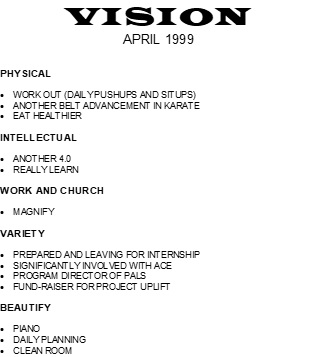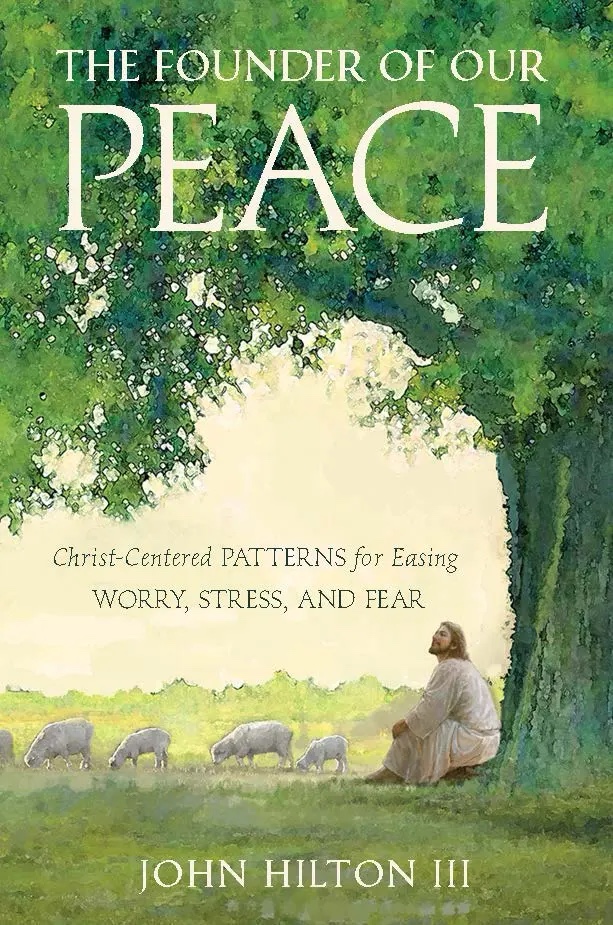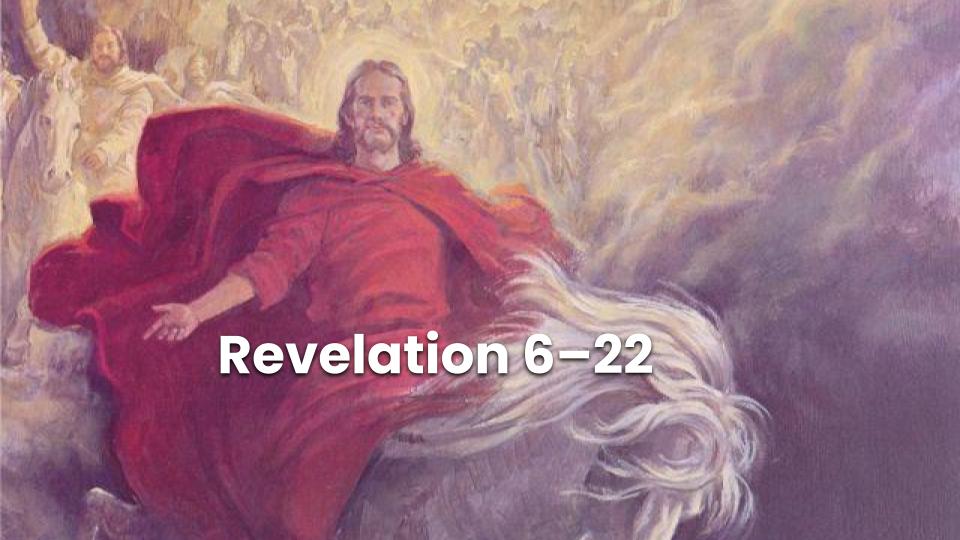This post expands on ideas from The Founder of our Peace. Learn more about this book on my Peace Page.
One of my favorite chapters in The Founder of our Peace focuses on understanding and implementing the Lord’s vision for your life. This is a topic I’ve thought about for years and in this post I want to share a couple of additional ideas that I didn’t include the chapter.
For me, the idea of understanding the Lord’s vision for my life first began when I was about 15 years old. At the time I wasn’t sure what type of person I would be, or how I fit in. I had recently moved from the junior high to the high school and I felt lost in the crowd. I noticed that a lot of the “cool” kids that I wanted to be like goofed around in class and did not put a lot of effort into their school work. I started to think that maybe that was the kind of person I wanted to be as well.
But when the semester changed I switched into a new biology class, and in this class there was a young woman who claimed to be the smartest student in the class. That struck a competitive chord in me. Even though I didn’t care about biology, I said to myself, “I will show her that I am smarter than she is.”
I began to work hard in biology, and before long, this young woman and I were neck and neck for the top grade in the class. I don’t remember which of us received the highest grade, but in the process of trying I realized that when I wanted to, I could do well in school. I started to get a different vision of the kind of person I could become, and it changed my life.
Spiritual Creation
When God created the earth he created everything twice—spiritually and then physically. In Moses 3:4-7 we read,
And now, behold, I say unto you, that these are the generations of the heaven and of the earth, when they were created, in the day that I, the Lord God, made the heaven and the earth,
And every plant of the field before it was in the earth, and every herb of the field before it grew. For I, the Lord God, created all things, of which I have spoken, spiritually, before they were naturally upon the face of the earth….
And I, the Lord God, formed man from the dust of the ground, and breathed into his nostrils the breath of life; and man became a living soul, the first flesh upon the earth, the first man also; nevertheless, all things were before created; but spiritually were they created and made according to my word (emphasis added).
In other words, before the animals or plants were put on earth they were spiritually created. Before humans were made physically we were created spiritually. We see the same thing today. Before the delicious dish is the recipe. We have blueprints before a house is physically built and a sewing pattern before a dress is made.
The entire process of the Creation gives us a great example of how we can create the kind of person we will become. For example, in Moses 2:4 we read that God “divided the light from the darkness.” Similarly, we can separate out in our lives the things that are most important (the light) from the things that matter less (the dark).
Another lesson from the Creation can be helpful. In Abraham 4, forms of the word “organize” are used ten times. So as I go about creating the kind of person I will become a key step is for me to organize myself and my plan for becoming better.
Tapping into the Lord’s Vision
So far, everything I’ve focused on could be done on our own—without God’s help. But as I describe more fully in The Founder of our Peace, God has plan for each of us, individually, that he will reveal line upon line. Only when we know we are on this course can we exercise true faith in Jesus Christ. It is important for us to tap into the direction the Lord has for us because, as the Proverb says, “Where there is no vision, the people perish” (Proverbs 29:18).
I once wrote about how I met my wife Lani. While that’s a funny (and miraculous) story, I didn’t share very much about what happened during the four months between our first and second date. Here’s that part of the story:
As I described elsewhere, after my first date with Lani, I felt that instead I needed to focus on myself and make myself a better person. In short, I needed to create a vision of what I could become, and then work on making that vision reality. I need to follow Elder Richard G. Scott’s counsel:
“You need a retreat of peace and quiet where periodically you can ponder and let the Lord establish the direction of your life. It may seem difficult to find time to meditate with the daily pressures of life. Yet a moment of thought will confirm that no matter how fast you move forward, if your are on the wrong path, it will avail you nothing. Each of us needs to periodically check our bearings and confirm that we are on course.”
Shortly after meeting Lani, I returned home for Christmas break. It was the perfect opportunity for me to create a vision of what I wanted to become in the next four months. In a sense I was “spiritually creating” the future me. I went to the temple. I gathered my scriptures, a paper and a pen and spent several hours praying and pondering, trying to find out what things Heavenly Father would have me do. I am not telling you about this to impress you, my hope is to give an example of how I was able to tap into the plan that the Lord had for me.
I was trying to do what Elder Richard G. Scott had instructed:
“The Lord has a purpose for you, individually…. Discover it and fulfill it. It will likely not be revealed all at once but will be unfolded line upon line. As you pray and work hard, you will find threads of understanding that will lead you to the path the Lord wants you to follow for the greatest enduring, meaningful attainment, contribution, joy, and peace of mind. Faithfully and courageously follow those threads of understanding and direction.”
Elder Jeffrey R. Holland also explained,
“I believe that in our own individual ways, God takes us to the grove or the mountain or the temple and there shows us the wonder of what his plan is for us. We may not see it as fully as Moses or Nephi or the brother of Jared did, but we see as much as we need to see in order to know the Lord’s will for us and to know that he loves us beyond mortal comprehension.”
As a result of the time I spent pondering I came up with a “Vision Statement” that looked like this (actual screenshot of the file!)

Though I created it in December of 1998, at the top of the page I put VISION: April 1999. In other words, it was a vision of what I would accomplish in the next semester. There were several aspects to my vision for my future self. Some were physical—I wanted to exercise more regularly and eat healthier. Others were intellectual—in addition to getting good grades, I wanted to focus on really learning. Have you noticed sometimes that you learn information to pass a test, but then forget it? I don’t think that is really learning, and my goal was to take my studies seriously enough so that I would really learn. There are three other parts of my vision statement I want to tell you about a little more in-depth. By April of 1999 I wanted to be
- PROGRAM DIRECTOR OF PALS
- FUND-RAISER FOR PROJECT UPLIFT
- PREPARED AND LEAVING FOR INTERNSHIP
What is unusual about these three things is that they did not exist at the time I made this statement. I wanted to be program director of “pals” –there was no such program. I wanted to organize a fundraiser (“project uplift”)—but I had none planned. I wanted to be prepared for an internship when I didn’t know where I would be going or I what I would be doing.
During the time I spent pondering my vision statement, I came up with an idea for a program I called PALS. The idea of this program was to have two BYU students pair up with a high school student who was in an at-risk situation and serve as mentors to him or her. At the time, BYU had a similar program but it was only for elementary school students—I wanted to do something for high school students.
I prayed about it and felt confident that the Lord wanted me to start the program. When I went back to BYU, I visited with the student body vice president over community service. At the time I was extremely nervous—I had never been a student body president or super-involved in college activities. What if my idea got shot down? If I hadn’t prayed about it, and felt like it was something Heavenly Father wanted me to do, I might not have gone through with it. But I needn’t have been so worried. My proposal was accepted. I found others who were interested in helping start the program. By the end of the semester we had 20 volunteers serving 10 high school students. (2020 update—the program is now called IMPACT and still exists at BYU!)
Another aspect of my vision statement was that I would be raising money to help others. As I continued to ponder this part of my vision statement I decided that the best way I could do this would be to organize a benefit concert. I was aware of an organization that needed money so that its volunteers to go to Honduras to help with hurricane-relief efforts. And I had some friends who were talented singers and willing to sing for free.
It took a lot of effort but I organized the concert. We earned about $1,000 that night—not a huge amount of money. But to me it was something more than money—it was a vision fulfilled.
Another part of my vision statement was that I would be prepared for and leaving for an internship. That’s I wanted to go to Mexico, or Central or South America. I didn’t get to serve a Spanish-speaking mission, but I had been taking Spanish classes and I wanted to have the chance to immerse myself in the language while also doing good for others and building my business skills.
I got a passport. I made connections with many individuals who worked internationally. But nothing became available. Soon, it got to the point where I was volunteering to work for free—and even pay for my own travel. But nobody wanted me—not even to sweep floors!
I go into more details in The Founder of our Peace, but the short version is that I realized this was part of a “line upon line” experience and my plans changed. That internship came one year later, shortly after Lani and I were married. Sometimes we accomplish the Lord’s vision for our lives in ways that we wouldn’t have originally imagined.
But enough about me—what about creating a vision of you?
Here are my thoughts on the best way to discover and implement the Lord’s vision for your life:
First, go on a personal retreat: One of the best decisions I ever made was to block out time after my first date with Lani and carefully consider the direction of my life. We do not need to travel to a faraway place, any quiet and peaceful place will do. We need periodic personal retreats where we get ourselves completely away from all outside distractions, consider the direction of our lives and allow the Lord to offer needed course corrections. Developing both long term (3-7 years) and shorter term (3-4 months) plans is extremely valuable during these retreats.
Second, have a clear multi-year plan for yourself that you feel is in harmony with God’s design for your life. It is helpful to step back and see the big picture. Think carefully about the next three to seven years of your life (if you’re under 25 think about the next three years, if you’re over 25 pick a five to seven year time span). What do you want to be doing professionally in five years? What do you hope your family will be like in five years? What skills do you want to develop in the next five years? What type of contribution do you want to make to your church and community in the next five years? What type of person do you want to become? On your periodic retreats, counsel with the Lord regarding the answers to these questions. Record your feelings and the impressions you receive from the Spirit. Then, work backwards to create a long-term plan of how you will get from where you are to where you want to be. This process expands our vision and helps us do things we could not otherwise accomplish.
It is also helpful for couples and families to have long-range plans. When our oldest of six children was 13, Lani and I took a retreat together and asked ourselves these types of questions. We realized we only had five summers before our eldest left home. What did we want to do with those summers? Pondering this question helped us realize that we wanted to do many things: spend a summer in another country, tour church and American history sites, be in a church pageant, and so forth. Because we carefully planned and sequenced, we had several special experiences as a family that we would have missed had Lani and I not looked over the horizon to plan the experiences we wanted to have as a family.
Third, have a specific, inspired 3-4 month plan that is geared toward helping you achieve your long-range vision. Most, if not all, of the long-range goals we set require multiple intermediate goals. Wanting to develop fluency in speaking Spanish required several significant shorter-term goals such as taking Spanish 101, Spanish 102, identifying potential internships, and so forth. Identifying specific objectives to accomplish over three to four months is vital to accomplishing our longer-range plans and overarching vision. Counsel with the Lord and determine the answer to the following question: “What are a few significant, attainable goals that I feel inspired to accomplish in the next 3-4 months?” A few months is sufficiently long to make significant accomplishments, and yet is not so long that any goal we set for ourselves will seem distant and unattainable.
Finally, plan each week: In order for us to accomplish our 3-4 month plans, we need to execute on a weekly level. God created the earth in seven days; there is something significant about a week that is vital to achieving our divine design. We should make time each week to plan the next seven days, carefully ensuring we are scheduling enough time to successfully accomplish our 3-4 month plan. Schedule significant blocks of time (early in the week/day if possible) to do the most important things that will help you accomplish your 3-4 month plan. We can have written statements of our long-range and short-term plans and goals in front of us as we plan each week. This helps focus our priorities so that we put our best efforts towards the most important things. Similar weekly planning times for couples and families can be vital to coordinate efforts about how we will realize God’s divine design for our families. If weekly planning is not a strong point in your life, purchase a good book on time management (see below) and implement the principles you learn.
In summary, when trying to discern God’s divine design in your life, go on periodic retreats where you can let the Lord establish the direction in your life. On these retreats, develop long-term (3-7 year) plans as well as short-term (3-4 month) strategies that help you implement your long-term plans. Each week, schedule significant blocks of time to work towards your 3-4 month plans. Hold these times sacred and prioritize them.
Remember these words from Elder Richard G. Scott:
“The Lord has placed currents of divine influence in your life that will lead you along the individual plan He would have you fulfill here on earth. Seek through the Spirit to identify it and carefully follow that direction that the Lord has put in your life. Align yourself with it. Choose, willingly, to exercise your agency to follow it. Do not be overcome by concentrating solely on today, its challenges, difficulties, and opportunities. Such preoccupations must not totally capture your attention so as to consume your life. Oh, how I would encourage you to weave deeply into the fabric of your soul the recognition that your life now is a part of a much bigger plan the Lord has for you…I do not fully understand how it is done, but this divine current does not take away your moral agency.”
Once you’ve tapped into the Lord’s vision for your life, know that there is still going to be opposition. As Jeffrey R. Holland said,
“After you have gotten the message, after you have paid the price to feel his love and hear the word of the Lord, “go forward.” Don’t fear, don’t vacillate, don’t quibble, don’t whine. You may, like Alma going to Ammonihah, have to find a route that leads an unusual way, but that is exactly what the Lord was doing here for the children of Israel. Nobody had ever crossed the Red Sea this way, but so what? There’s always a first time. With the spirit of revelation, dismiss your fears and wade in with both feet. In the words of Joseph Smith, “Brethren [and, I would add, sisters], shall we not go on in so great a cause? Go forward and not backward. Courage, brethren; and on, on to the victory!” (D&C 128:22).”
As I described in The Founder of our Peace, our plans don’t always work out (remember my epically failed project!) But I know that God does has a vision for our lives and as we work to discern and implement, miracles can take place!
Additional Resources
“Receiving, Recognizing, and Responding to the Promptings of the Holy Ghost”
“Have Ye Inquired of the Lord?”
Seven Habits of Highly Effective People
15 Secrets Successful People Know About Time Management
Sign up to receive occasional emails with more posts like this one
Read blog posts related to principles from The Founder of our Peace






